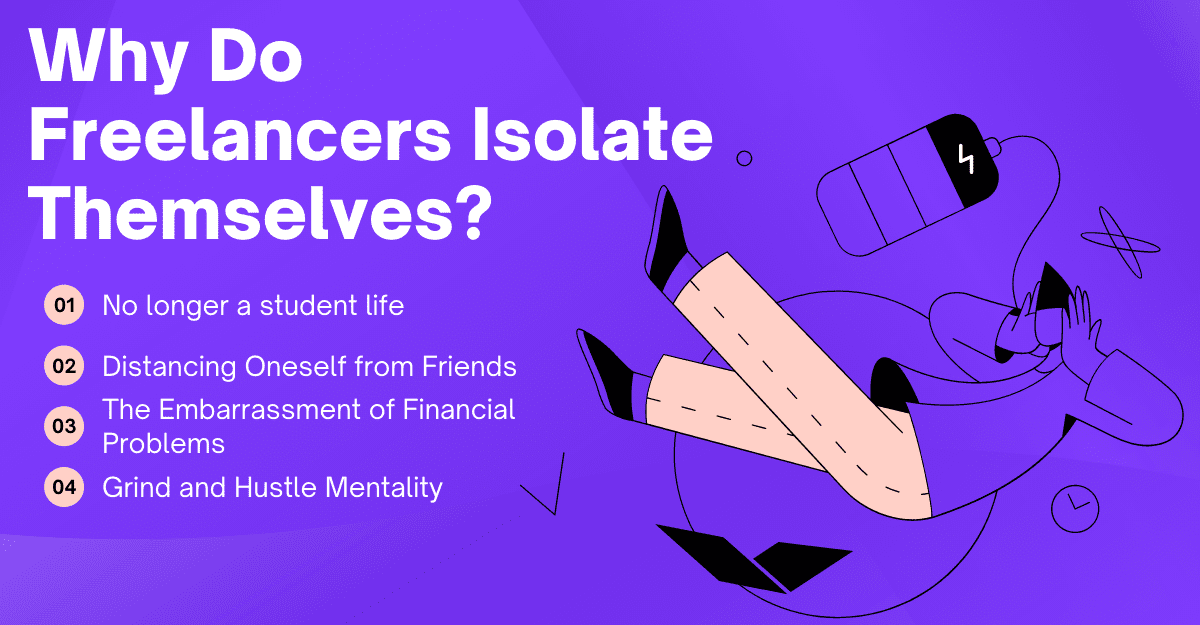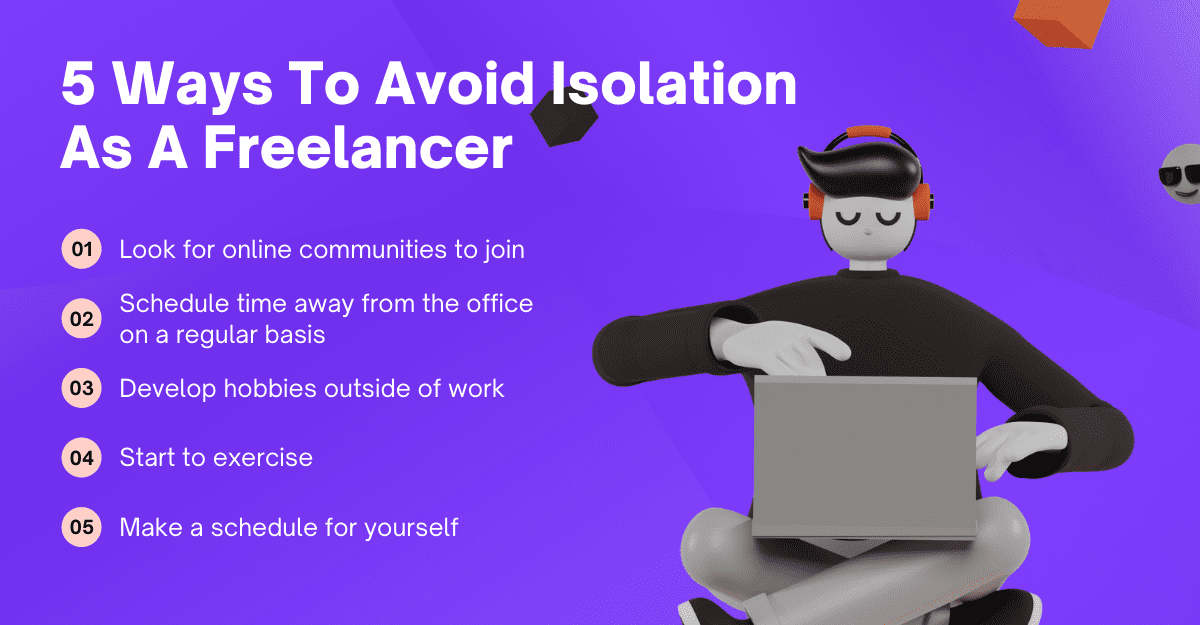One of the most difficult tasks for today’s freelancers is ensuring they have access to a community. Working from home has its advantages, but it is not without its drawbacks. Freelancer Isolation management is one of the most difficult tasks.
To begin with, the peace and quiet can be invigorating, but working alone can become lonely after a time. You miss out on the office banter, chit-chat, and companionship. More significantly, you don’t have any colleagues with whom you can bounce ideas or discuss concerns.
If you’re a new freelancer and aren’t sure where to work, check out our guide for tips on how to enhance your productivity by working from home.
You’re not alone if you’re experiencing freelancer isolation, and the good news is that there are things you can do about it.
Check out why mental health is important for freelancers.
Why Do Freelancers Isolate Themselves?

1. No Longer A Student Life
Kids and teenagers have school days to provide some face-to-face interaction with others while attending school.
Moreover, living with relatives at home should have provided some beneficial encounters on a regular basis. These circumstances may have aided in achieving some equilibrium.
However, once they switch to living alone and freelancing full-time, some people discover that their social life disappears and they have little need to engage with others.
Learn how can you freelance while working full time in this guide.
2. Distancing Oneself From Friends
When people move to a different city or state, their former friendships may fade away over time. Even if individuals do not relocate, their friends may. Perhaps their friends became preoccupied with starting a family while they remained single.
3. The Embarrassment Of Financial Problems
Another reason that is frequently overlooked is the fact that a considerable number of freelancers face financial difficulties.
Some people even spend a lot of money on their workspace, tools (software, computers, internet services, etc. ), training, marketing, and other things before they can afford it. They eventually find themselves in debt and unable to pay their bills.
Are you unsure of how to handle your finances? This post will teach you how to manage your finances as a freelancer.
Meanwhile, their peers who acquired regular jobs appear to be doing well financially and have great professions, according to their social media posts. This can lead to feelings of guilt and embarrassment, making freelancers hesitant to socialize with their friends.
4. The Grind And Hustle Mentality
Through social media, a wide range of influencers provides guidance and motivation to freelancers. Many people extol the virtues of “hustle” and “grind.”
They brag about going without sleep, working long shifts, and not taking a day off in years, all while attaining great success.
This can lead a self-isolated freelancer to assume that if they only concentrate and work harder, they can reach equal success. They believe that greater lonely toil is required to earn the right to go out and enjoy socialisation because their default mode is to go it alone.
Why Is Too Much Isolation Bad For You?
People who are naturally open and gregarious are constantly looking for opportunities to mingle and connect with others in all aspects of their lives. As a result, persons who are naturally at ease spending time alone are more likely to fall into a cycle of growing isolation, which can become unhealthy.
Excessive social interaction deprivation depletes people’s vitality and creativity while also stressing them out. However, loners are frequently uninformed of this link and feel that the best option is to stay at home and work longer and harder until they are redeemed by the rewards of their labour and have earned the right to socialise.
The tension awakens our primal instincts, and we may seek solace in overeating in food, booze, television, social networking sites, and anything else that may bring temporary respite. The guilt and embarrassment we feel as a result of this can make us even less inclined to go out.
Naturally, this scenario affects our productivity and the quality of our work, which might exacerbate the negative cycle. As a result, we could feel like we’re caught in a rut.
How To Incorporate Socializing Into Your Workday
Excessive social isolation is clearly a concern. While everyone’s limits are different, it’s evident that we all require a certain amount of good and meaningful social engagement on a regular basis.
You’re undoubtedly scared that socialising will take time away from your work if you’re prone to self-isolation. This may encourage you to join a freelancer in order to connect with others in your circumstance. These internet resources are valuable, but they can’t replace face-to-face encounters with people.
Let’s have a look at a few options for combining work and socialising. They can truly enhance your productivity while also enhancing your mental health if addressed right. In order of commitment and feasibility, I’ll list three possibilities.
1. Meetups For Networking
Meetups are a low-cost, low-risk way to meet new people who share your interests. The meetup’s topic doesn’t have to be directly related to your profession.
You could find that choosing one that is about one of your passions helps you connect with people more authentically. This can lead to them being curious about what you do for a living. They may require your services or be able to suggest you to someone who does.
- Clubs
You might not be physically fit enough to go mountaineering or practise martial arts. If you are, consider joining a club to gradually reintroduce yourself to those activities. If not, see if there are any other clubs in your region. Perhaps art or photography would be a better fit for you. If a club isn’t a good fit for you after one visit, keep looking.
- Classes and Courses
Is there anything you’d like to learn as a freelancer that will increase your marketability and productivity? Consider attending classes in person instead of taking courses and learning material online. This may allow you to communicate with the teacher and meet peers with similar interests. Before you commit, take a look at it.
2. Work Dates In Cafes
Consider organising hours to work together with one or more local freelancers if you have a good cafe nearby.
There are various advantages to this setup:
- Refreshing – It compels you to get out of your pyjamas, clean yourself up a little, put on clothing, step outdoors, and go somewhere, even if it’s just to the local Starbucks. This straightforward procedure can be exhilarating.
- Interaction with Baristas and Other Customers: You will engage with the baristas and potentially other customers.
- Schedule: If the meeting is held on a regular basis, you’ll have something to anticipate and prepare around.
- Motivation: Being in the company of others who are also working can motivate you to put more effort into your own work.
- Sharing: You can ask each other questions and help each other solve difficulties if you have complementary abilities or expertise. You may even exchange contacts or refer clients to each other.
It doesn’t have to be 24 hours a day, seven days a week. Even a few hours a week will be beneficial to both of you. Other options for work dates include libraries or each other’s houses, in addition to cafes.
3. Collaborative Working And Living
If you’re having financial difficulties, avoid this section because the costs will only make matters worse. Coworking and co-living might allow you to socialise and network during your breaks if you have your finances in order.
Companies of all sizes engage with global coworking space providers to provide workspace for travelling employees or teams getting together for ad-hoc projects; not all coworking space users are freelancers or solopreneurs. You might meet someone from a company that has an immediate need for someone with your expertise and would rather hire a freelancer than hire a full-time employee.
4. Collaborative Living Spaces
These are coworking spaces that also serve as housing quarters. There are many different types of living/working arrangements, property ratings, locations, pricing schemes, and facilities to choose from.
In metropolitan settings, an apartment building with one or two floors of shared facilities is a popular model. There may or may not be a toilet, shower, bath, or kitchen in each room.
The social benefits are similar to those of coworking spaces, but because you live with people and may encounter them at all hours of the week in various situations, you may build closer bonds. Depending on the property, there may be a mix of long-term residents and short-term visitors.
As a freelancer, this will not only aid with isolation but also provide a better work-life balance.
5 Ways To Avoid Isolation As A Freelancer

- Look For Online Communities To Join
It’s unlikely that your spouse or other family members who aren’t freelancers fully comprehend what you do. This implies they may not be interested in listening to you talk endlessly about your difficult client or understanding the details of a document that went through 45 versions before the client accepted it.
For these reasons, you’ll need a network of other freelancers who understand what you’re talking about, even if it’s simply to laugh with, exchange amusing stories with, and encourage one another. There are many fantastic online groups where you may meet other freelancers and form relationships, either as a group or in smaller networks.
- Schedule Time Away From The Office On A Regular Basis.
Even though it’s difficult to do so, it’s critical to spend time away from your actual office. It could be as simple as a brief walk around the neighbourhood or lunch with a friend, but it’s critical to schedule time away from your business on a regular basis.
Freelancers frequently develop tunnel vision and spend their entire waking hours thinking about their profession. This is neither good for you nor for your company.
- Develop Hobbies Outside Of Work.
As previously stated, it’s all too easy to find oneself working nonstop. Picking up a new pastime or learning activity that has nothing to do with your business is one of the easiest methods to avoid this.
Bonus points if it allows you to do something physical or with your hands rather than sitting at your computer. These can be highly valuable in terms of learning new things and broadening your skillset outside of the workplace. It’s also an excellent time to let your mind wander and think about something different.
- Exercise
Physical activity is beneficial to the mind, body, and spirit. It also aids in avoiding solitude if you consider ways to interact with others.
It’s motivating to communicate with others who are focused on their health, and the app helps me get moving when I realise I haven’t done enough steps for the day.
- Make A Schedule For Yourself.
Whatever method you select to combat isolation, schedule it in your calendar on a regular basis. It’s all too easy to get caught up in your work and forget about the loneliness.
On Sunday afternoons, I enjoy going through my calendar for ways to incorporate more involvement and community into my life. It’s wonderful to keep things fresh and exciting to break up the loneliness of the freelance workday, whether it’s a virtual coffee with someone I haven’t spoken to in a while or planning a “happy hour” style event as a group playing a game together.
Check out our post on how to maintain a schedule as a freelancer.
Conclusion
There are a variety of approaches that can be used to combat freelancer isolation. There are as many as your imagination will allow. There are several critical reasons to combat isolation, including our mental health and a lack of assistance to manage a business.
Make an effort to become a part of a community, particularly a local community, to help you feel less isolated.
In addition, in this post, learn how to deal with true freelance burnout.
What do you do to avoid feeling lonely as a freelancer? Please let us know in the comments section below.


















